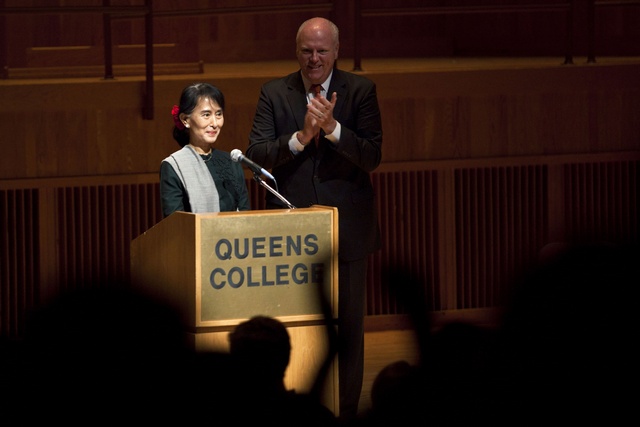As Aung San Suu Kyi jets across the US to collect further accolades, she continues to attract criticism over Burma’s persecuted minorities. The past few months have been increasingly coloured by her silence on the stateless Rohingya minority, viewed as “illegal Bengali immigrants” by many Burmese, while US Kachin groups boycotted her Congressional award ceremony in protest of the ongoing conflict in Northern Burma.
Speaking to reporters last week, she continued to feed the critics by claiming that her political party, the National League for Democracy (NLD), could not weigh into the Rohingya debate, because they are not the party in government – a statement perhaps as ludicrous as it seemed insincere.
But according to some of her international supporters it could do more harm than good to criticise Burma’s leading democracy champion at this time.
“In this fragile transition, too much public criticism of her is not necessarily helpful,” Benedict Rogers, East Asia Team Leader at Christian Solidarity Worldwide, told DVB in an interview. “In my view, it is more useful to express concerns privately and constructively.”
Rogers argues that it is in the best interest of Burma’s pro-democracy movement to support Suu Kyi and the NLD in the run-up to the 2015 elections, as they are best placed to challenge the military’s supremacy in parliament.
“Suu Kyi and the NLD have for over 20 years been the primary representatives of the movement for democracy and the primary opposition to the regime,” explains Rogers. “She personally and the NLD as a whole are absolutely crucial to the transition.”
This is certainly true. But what is less clear is how they would benefit the stateless Rohingya, who are widely reviled even within the NLD. Reports suggest that foreign leaders, including UK Foreign Minister William Hague and the Dalai Lama have both privately urged Suu Kyi to confront the Rohingya issue, but it has fallen on deaf ears.
[pullquote] “It is absolutely necessary to criticise her now” [/pullquote]
Meanwhile other senior figures, including party spokesperson Nyan Win and founding member Win Tin have unequivocally declared that the Rohingya cannot be considered Burmese citizens.
Suu Kyi has faced similar criticisms over Burma’s myriad ethnic conflicts, notably for her failure to condemn the army’s ongoing assault on Kachin state. Unlike the Rohingya issue, there seems to be little obvious political capital in her silence. Some analysts have speculated that by working with the government, she has lost her ability to challenge them. Or perhaps it is simply not one of her immediate priorities. Either way, it seems unreasonable to wait three years to ask the Nobel peace laureate to speak out.
“The trust in her [Suu Kyi] has gone down,” Shan democracy activist Khun Htun Oo told reporters in Washington DC on Thursday. “If she goes on like this she will not represent the people. She does not say anything for the public.”
It is also important not to overcook the political significance of the 2015 elections. Although the NLD could be in a position to form a government, the 2008 constitution guarantees the military a firm hand in public policy. Unless the NLD and opposition forces secure every single parliamentary seat up for grabs, they will still be unable to amend the undemocratic 2008 legislation without the military’s support. Suu Kyi and the NLD will still have to cooperate with the Tatmadaw.
The democracy icon is herself precluded from being elected president in 2015 under the constitution, given her two sons’ foreign citizenship, a provision likely drafted with her disadvantage in mind. While she would certainly assume a senior position in government in the event of the NLD’s victory, blindly backing Suu Kyi nonetheless translates into wholesale political support of the Burman-led party.
This logic feeds into a binary understanding of Burmese politics, which has for years been dominated by a “good guys versus bad guys” paradigm that ignores ethnic and other domestic complexities. The military-backed Union Solidarity and Development Party (USDP) is itself split between reformists and hardliners, which the recent constitutional tribunal dispute has illuminated. Unlike the NLD, there is even a Rohingya member of parliament.
The past few weeks have also begun to reveal internal fractures within the NLD, as a number of grassroots members have hit back at its “authoritarian” political leadership, resulting in the suspension of several of them.
“The NLD is looking to become a ruling democratic party after the 2015 elections, it is necessary for us to speak out on these issue contradicting democratic standards,” said Dr Than Htike, who was recently suspended for publicly accusing the party’s Central Committee of power centralisation and factionalism.
The reality is that the NLD, like the USDP, are both relatively new political parties with limited experience handling a democratic process. Both should be subject to scrutiny and encouraged to reform. In a transitional democracy currently dominated by the personal dynamics of two ageing politicians, this should not be a tough sell.
“It is absolutely necessary to criticise her now, in the run-up to the 2015 election, and after,” Bertil Lintner, veteran journalist and author of several books on Burma, told DVB. “Part of the problem in Burma today, and which could be her downfall, is that she is surrounded by sycophants who don’t dare to tell her when they think she is wrong. They don’t even dare to give her meaningful advice.”
Over the next three years, the focus should be on developing healthy political institutions and empowering the people of Burma to take ownership of the democratisation process. While domestic voices are particularly important, the international community also has a role. This can, and must, include challenging the leadership of all political parties, including Aung San Suu Kyi.



